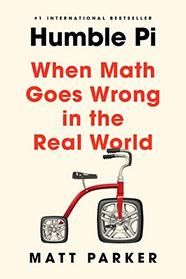While I love fiction, I also read anything and everything, which is why I picked up this nonfiction book with its intriguing cover of a bike with square wheels. Human fallibility intersecting with mathematics, engineering, and technology are on full display in this tome with page numbers going backward and math mistakes inserted deliberately.
Parker describes math problems - or, rather, problems that have occurred due to mess-ups humans made with numbers - across a gamut of society and history, with engineering tests, financial problems, measuring units that don't match, predictions, rounding numbers, and random number generating, among many others. He does this best with the many true narratives throughout. Some of the most powerful include airplanes that almost went down (or did), shaky bridges (or collapsed ones), the Challenger disaster, and deaths from radiation machines. The stories are supplemented with many images of mathematical mistakes: UK soccer stadium signs with improbable shapes, incorrectly mounted latches on doors, gridlocked cogs on inspirational educational posters, the Hubble mirror incorrectly shaped, etc.
A lot of the book explains limits of and problems with computer programming numbers. While the results of the problems are clear (like malfunctions), the jargon and mathematical language for those sections and others about probability (such as terms like "standard deviation" and computer coding languages) are too obscure for the average reader - though I imagine that professional mathematicians and computer programmers will understand. As I read, if I "got stuck" in those sections, I forged ahead to get to Parker's next true narrative, which is usually sprinkled with wry humor. (It should be noted that Parker is also a stand-up comedian).
I closed the book having been confused, tantalized, shocked, and forewarned. According to Parker, on Jan. 19, 2038, computers will stop working, due to complications of binary numbers and Unix time. Thankfully, we have eighteen years to solve that problem. We also have his "Swiss cheese model," which he adapts into the "fondue pot of disaster" model, which may mitigate in the meantime. You'll have to read to discover those details!
Parker describes math problems - or, rather, problems that have occurred due to mess-ups humans made with numbers - across a gamut of society and history, with engineering tests, financial problems, measuring units that don't match, predictions, rounding numbers, and random number generating, among many others. He does this best with the many true narratives throughout. Some of the most powerful include airplanes that almost went down (or did), shaky bridges (or collapsed ones), the Challenger disaster, and deaths from radiation machines. The stories are supplemented with many images of mathematical mistakes: UK soccer stadium signs with improbable shapes, incorrectly mounted latches on doors, gridlocked cogs on inspirational educational posters, the Hubble mirror incorrectly shaped, etc.
A lot of the book explains limits of and problems with computer programming numbers. While the results of the problems are clear (like malfunctions), the jargon and mathematical language for those sections and others about probability (such as terms like "standard deviation" and computer coding languages) are too obscure for the average reader - though I imagine that professional mathematicians and computer programmers will understand. As I read, if I "got stuck" in those sections, I forged ahead to get to Parker's next true narrative, which is usually sprinkled with wry humor. (It should be noted that Parker is also a stand-up comedian).
I closed the book having been confused, tantalized, shocked, and forewarned. According to Parker, on Jan. 19, 2038, computers will stop working, due to complications of binary numbers and Unix time. Thankfully, we have eighteen years to solve that problem. We also have his "Swiss cheese model," which he adapts into the "fondue pot of disaster" model, which may mitigate in the meantime. You'll have to read to discover those details!




